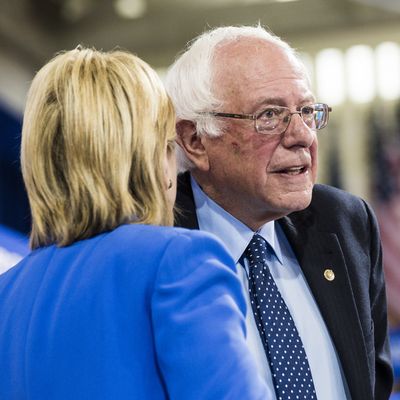
While picking through the WikiLeaks release of John Podesta’s emails, the industrious libertarians at Reason found something they think indicates hypocrisy, but may just reflect the context of a presidential campaign. Seems there was internal debate in the Clinton campaign over fears held by some liberal economists that a $15-an-hour minimum wage might cause job losses.
As Sean Higgins of The Washington Examiner reports, an April 2015 email from [Neera] Tanden to four senior Clinton staffers responding to a list of policy proposals states that “Substantively, we have not supported $15—you will get a fair number of liberal economists who will say it will lose jobs.” (The email was obtained through an illegal hack, and published by Wikileaks.)
Clinton much later, of course, said she’d sign legislation raising the minimum wage to $15 if it came to her desk, after earlier supporting a $12 minimum wage. This was widely interpreted as an effort to neutralize an issue that Bernie Sanders was using against her quite effectively.
To Reason’s Peter Suderman, that’s evidence of hypocrisy: Clinton’s people knew there was a risk of job loss associated with that high of a minimum-wage level, and she endorsed it anyway as an act of “purely cynical political pandering.”
I guess that’s one way of interpreting it. Another would be that Clinton and her staff didn’t imagine they (or Bernie Sanders) would be in a position to dictate the national minimum wage to a Congress that would likely be at least partially controlled by Republicans, who, like Reason itself, are prone to look dimly on any kind of minimum-wage increase (and in some cases, on the very idea of the minimum wage).
Now, of course, thanks in no small part to Donald Trump, there is suddenly a possibility that Democrats will control both houses of Congress, which makes all of Clinton’s policy proposals, including the $15 minimum wage, more relevant to actual life.
So if Democrats do control Congress, will Clinton backtrack in horror on her and Bernie’s minimum-wage proposal, knowing there are economic issues with it?
Maybe, but more likely she will not have to. For one thing, both she and Sanders proposed a phase-in of the higher minimum wage, which means any marginal effect on net employment, or regional problems in low-wage areas where $15 an hour is above the median wage, can be gauged and accounted for. For another thing, unless Democrats kill the filibuster once and for all early on, Republicans will still have a chokehold on controversial legislation in the Senate so long as they have 41 votes. And even if the filibuster is killed right away, there’s no guarantee all Democrats will go along with a $15 minimum wage.
Remember the public option in the original Obamacare proposal? It did not survive a Senate with 60 Democrats, because several of them objected to the very idea. Yes, the House and Senate Democratic caucuses are more liberal than they were as recently as 2010. But it’s likely some adjustments will have to be made in areas like the minimum wage just to get all Democrats onboard — particularly those from states or districts where employers credibly show major job losses would ensue.
If people keep stealing and digging around in Clinton campaign emails, maybe they’ll find some talk about this very eventuality. I don’t think it’s particularly amoral to forgive Hillary Clinton for not going through these possibilities in public. You cannot entirely take the politics out of politics. But this incident does provide everybody with the reminder that you should only propose policies you are willing to implement, even if you think that won’t happen.






























